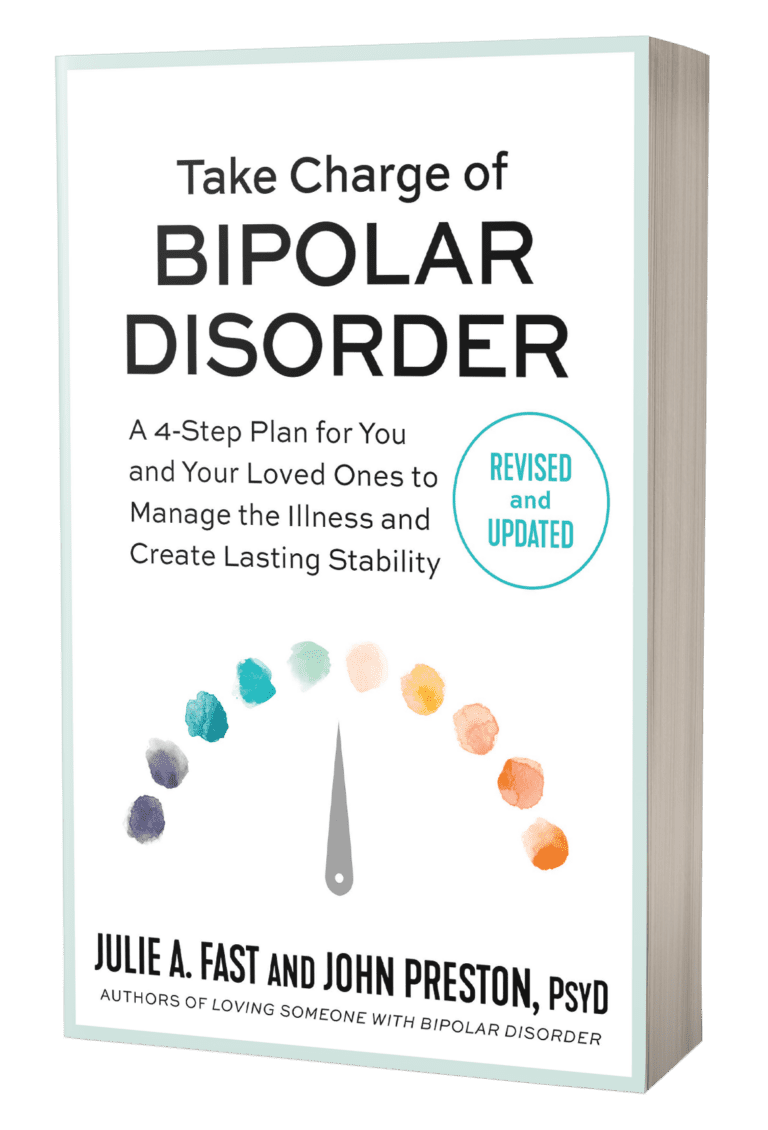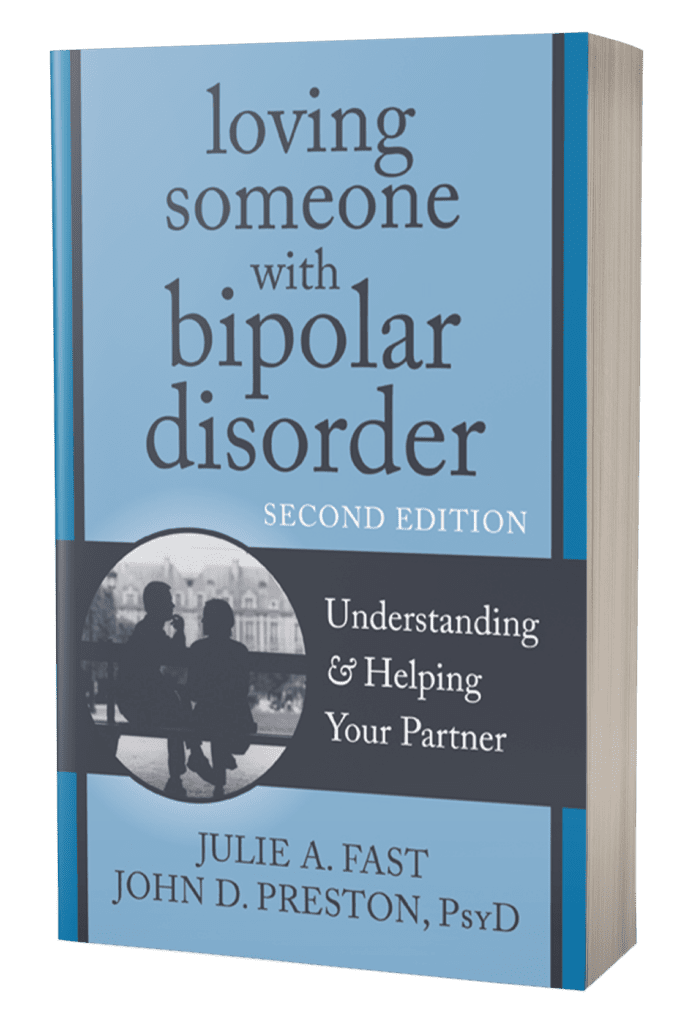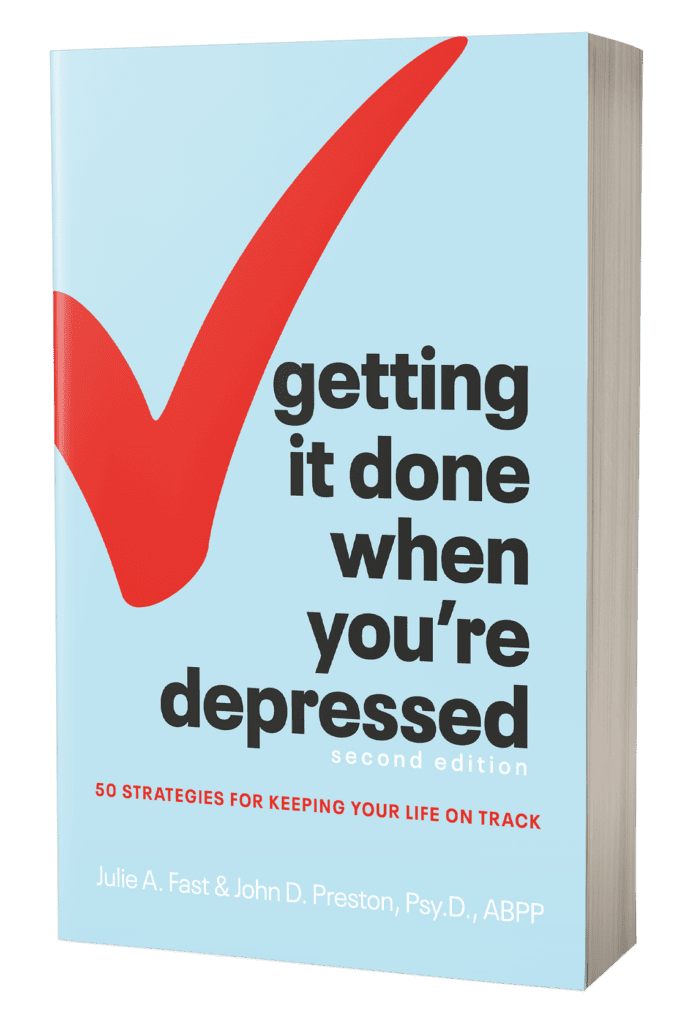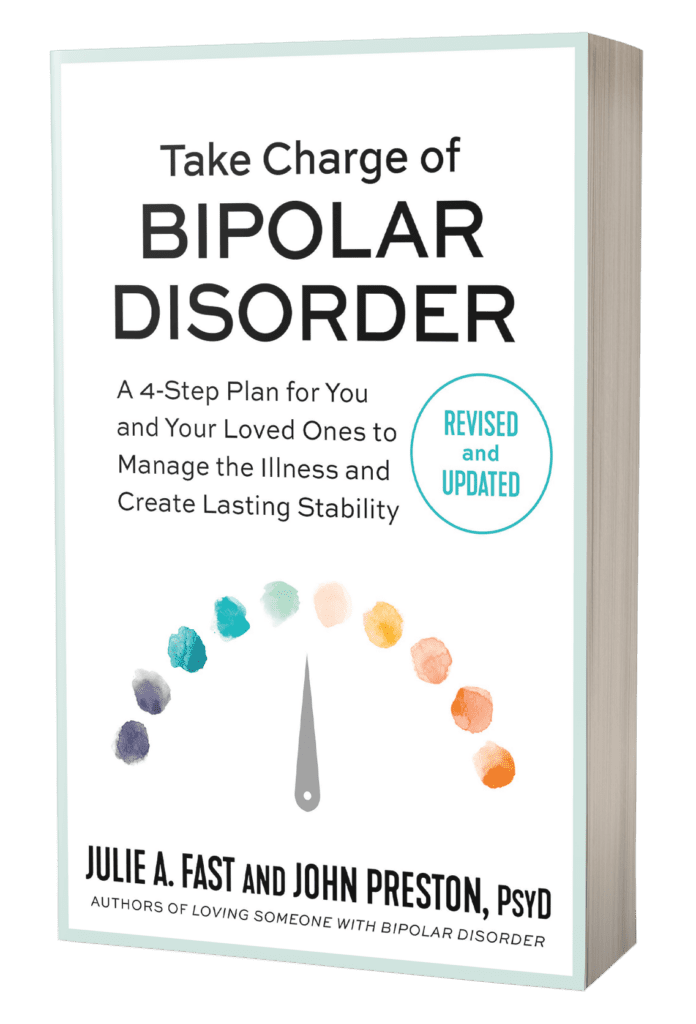Julie's
Books

Julie’s books address the person with the illness as well as those who want to help a loved one or client find stability. Her books have been translated into many languages and her system is used by millions of people around the world. Her system has been tested personally and professionally for over 20 years. Her goal is simple- to help people all over the world recognize the symptoms of bipolar disorder and psychosis early enough to prevent the chaos of untreated brain illness.

Take Charge of Bipolar Disorder
Take Charge was the first bipolar disorder management book and is still the gold standard for those who want to learn how to manage bipolar disorder symptoms. The book’s audience includes those with bipolar, family members, friends, partners and health care professions.
The second edition is now available. Along with Julie’s treatment and management plan, the new edition includes her research on mania in the eyes, ketogenic metabolic therapy for bipolar and her Bipolar Significant Seven list on substances that negatively affect the bipolar brain.

Loving Someone with Bipolar Disorder
The first ever book for a partner of someone with a brain illness, Loving Someone with Bipolar Disorder covers the basics of bipolar disorder and then shares strategies for communication, self care, treatment, and management specifically for a partner or coparent. Julie understands the topic from both sides and shares what it’s like to have a partner with bipolar disorder and then offers the perspective of having bipolar herself. Julie shares the story of her long term relationship with her partner Ivan who lives with bipolar one and teaches partners and health care professionals how to help someone with bipolar disorder find stability.

Getting It Done When You’re Depressed
Getting it Done When You’re Depressed teaches the reader how to function while in a depression episode. It’s the first book to address the reality that many people with depression need time to find stability and during that time, they still have to get things done. The book helps family members, partners and health care professionals create a plan to use with a loved one who may feel too ill to take action.
The second edition includes strategies to manage social media use during a downswing as well as ideas for family members and partners who want to help a person in a depressive episode.
“Expert by Experience”—that’s Julie Fast. She was an expert in 2006 when the first edition of this book was published. She’s even more of an expert now, having spent years working with people with bipolar disorder, and helping them improve their lives.
As a psychiatrist, I learned most of what I know from my patients. They’re the ones who know the many, tiny details of bipolar disorder experience. If one has the opportunity to listen closely to many people describing their symptoms, even someone who doesn’t have bipolar disorder can come to understand the subtleties of the experience.
But Julie Fast had a big head start on me: she knows bipolar disorder from the inside as well. And, in the last 15 years, she’s continued to be one of the most diligent students of bipolar disorder that I know. “Student” in this case meaning a life-long learner. She’s been preparing a new edition of this book for years because she’s always looking for another insight into this so-complex human experience, this bipolar thing.
-Dr. Jim Phelps
![]()
I you could only buy one book about bipolar…
If you could only buy one book about bipolar disorder and how to manage it, THIS IS IT! A book written for people with the illness by someone with the illness. It is easy to navigate & read and covers so many aspect of the illness, from detecting symptoms, to managing relationships, to beneficial lifestyle changes around diet, sleep, exercise, light, and substances. I cannot stress enough what a valuable book this is. It’s also a great read for those who know someone with bipolar disorder and want to learn more.
-Ren
Three of the biggest things that have helped me are…
1. Saying out loud to myself and my husband “I am not the problem, you are not the problem – BIPOLAR is the problem. . It’s us against bipolar!”
2. It really calms me down and helps me to stay in the moment when I remind myself not to take so much of this personally. My husband is so difficult when the mood swings are raging, but I now know that it’s not him talking, it’s bipolar talking.
3. The difference between reacting and responding. Huge! It definitely takes practice and patience but can diffuse a crisis with just a well thought out response instead of an emotional reaction. The Bipolar Conversation chapter really helps.
Your book has already helped me immeasurably in just a few months. I am so grateful to you for what you have done and what you continue to do!
This book has been very helpful. It’s real, and you can tell it’s meant for someone with diagnosed depression. It is not a gimmick self-help book, not in the least! If you suffer from depression, this is a MUST read!
Julie, you are the only person I have read who lives with what they write about at the same time you are helping others. You turned your terrible experiences into a positive for helping others who get depressed. Thank you Julie.
Many different people will read this book:
- People recently diagnosed with bipolar disorder who seek a way to manage the illness successfully and ultimately prevent mood swings.
- People living with bipolar disorder for many years who hope to find more tools to manage the illness more effectively.
- Family members and partners who just went through the often life changing experience of a loved one’s diagnosis.
- Grandparents, parents, siblings, and friends of someone who is really struggling or lacks the insight needed to get help.
- Health care professionals who want to learn more effective management strategies to use with clients.
Whoever you are, Take Charge of Bipolar Disorder can help you learn to manage or help someone manage bipolar disorder. A comprehensive treatment plan doesn’t leave anyone out. Everyone matters, and everyone can help and find help. Bipolar disorder does not only affect the person with the illness. It also affects anyone who has a personal or professional relationship with the person who has the illness. Because of this, Take Charge of Bipolar Disorder discusses the needs of the person with bipolar disorder as well as the needs of family members, partners, friends, and health care professionals.
Your Current Treatment Options
Bipolar disorder is a very complex illness. It’s also serious and can be life threatening if unmanaged. Thus, the person with the illness needs a variety of techniques to manage symptoms successfully. Although some people can use medications alone to get back to a more stable life, for many people this isn’t the reality. Most people with bipolar disorder realize they need more than medications, but aren’t sure of their choices. The most effective plan combines medications, lifestyle changes, behavior modifications, and the most effective way to ask for help. The goal of this book is to help you find the right combination of medications and management strategies for lasting stability.
What Is the Take Charge Plan?
The Take Charge Plan can be seen as a pie. One quarter of the pie is medications and bipolar safe supplements. The second quarter includes lifestyle changes. The third covers behavioral changes, while the final piece of the pie teaches people with bipolar disorder how to reach out for support and ask for help from the right people.



